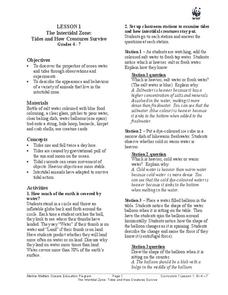Wilderness Classroom
Ocean Life
Our oceans are composed of many complex relationships. Young oceanographers explore relationships between organisms, understand the world ocean's currents, and discover the effects of water pollution and how it behaves. There are...
NOAA
Ocean Primary Production
A cold seep is an area on the ocean floor where hydrocarbons leak from the earth, creating entire unique biomes. Learners explore cold seeps, photosynthesis in the ocean, and its limitations due to loss of sunlight. They further explore...
NOAA
I Can't Breathe!
The Gulf of Mexico dead zone, an area of low oxygen that kills marine life, costs the United States $82 million every year. Young scientists research anoxic ocean environments then come up with a hypothesis for the cause of the Gulf of...
NOAA
Fishy Deep-sea Designs!
Oceans represent more than 80 percent of all habitats, yet we know less about them than most other habitats on the planet. The instructor introduces the epipelagic, mesopelagic, bathypelagic, twilight, and midnight zones in the ocean....
Curated OER
The Intertidal Zone: Tides and How Creatures Survive
Students study the properties of ocean water and tides and learn about animals that live in intertidal zones. In this intertidal zone lesson, students participate in classroom stations to learn about fresh water and salt water, cold...
Mr. E. Science
Climate and Climate Change
What factors make up climate? How does longitude and latitude affect climate? What is causing Earth's climate to change? These questions are the topic of a presentation that explains characteristics of climate and climate change.





